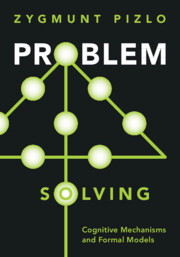Book contents
- Problem Solving
- Problem Solving
- Copyright page
- Dedication
- Contents
- Figures
- Tables
- Preface
- Chapter 1 Problem Solving
- Chapter 2 Animal Problem Solving
- Chapter 3 Modern Research on the Human Ability to Solve Problems that Have Large Search Spaces
- Chapter 4 The Exponential Pyramid Representation that Compensates for Exponentially Large Problem Spaces
- Chapter 5 Heuristic Function, Distance, and Direction in Solving Problems
- Chapter 6 Insight and Creative Thinking
- Chapter 7 Inference in Perception
- Chapter 8 Cognitive Inferences, Mental Representations
- Chapter 9 Theory of Mind
- Chapter 10 Solving Problems in Physics and Mathematics
- Chapter 11 Summary and Conclusions
- References
- Index
Chapter 8 - Cognitive Inferences, Mental Representations
Published online by Cambridge University Press: 23 June 2022
- Problem Solving
- Problem Solving
- Copyright page
- Dedication
- Contents
- Figures
- Tables
- Preface
- Chapter 1 Problem Solving
- Chapter 2 Animal Problem Solving
- Chapter 3 Modern Research on the Human Ability to Solve Problems that Have Large Search Spaces
- Chapter 4 The Exponential Pyramid Representation that Compensates for Exponentially Large Problem Spaces
- Chapter 5 Heuristic Function, Distance, and Direction in Solving Problems
- Chapter 6 Insight and Creative Thinking
- Chapter 7 Inference in Perception
- Chapter 8 Cognitive Inferences, Mental Representations
- Chapter 9 Theory of Mind
- Chapter 10 Solving Problems in Physics and Mathematics
- Chapter 11 Summary and Conclusions
- References
- Index
Summary
This chapter elaborates what you learned in Chapter 7. It points out that despite the fact that many problems have an obvious visual representation, we need to be able to incorporate more abstract cognitive representations in our theory of problem solving. Traditionally, multidimensional scaling (MDS) has been used to infer Euclidean representations of concepts based on judged similarities. Here, after providing an example of how MDS has been used in vision, some cautionary comments are made about what MDS can and cannot provide. Because MDS is usually used to represent clusters of concepts, a formal discussion of clustering is included in this chapter. The chapter continues with two examples: one that is related to clustering in long-term memory and the other related to clustering in short-term memory. In both cases, clustering is used to interpret the mental navigation of memory representations as being analogous to navigation in our physical environment, just as it was when we discussed the TSP. The last section of this chapter illustrates how MDS can be used to explain how TSP tours are produced in the presence of obstacles where obstacles change the pairwise distances and make the distances not Euclidean. MDS can use the pairwise distances around obstacles to produce a Euclidean approximation. Preliminary experimental evidence suggests that this is what the human mind does.
Keywords
Information
- Type
- Chapter
- Information
- Problem SolvingCognitive Mechanisms and Formal Models, pp. 128 - 145Publisher: Cambridge University PressPrint publication year: 2022
